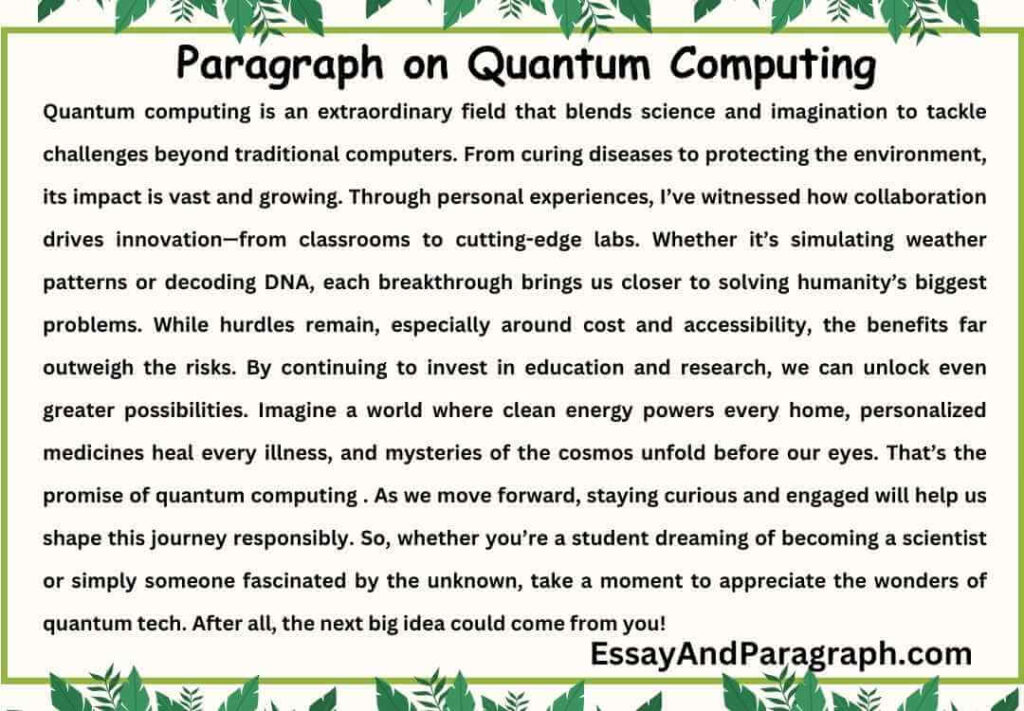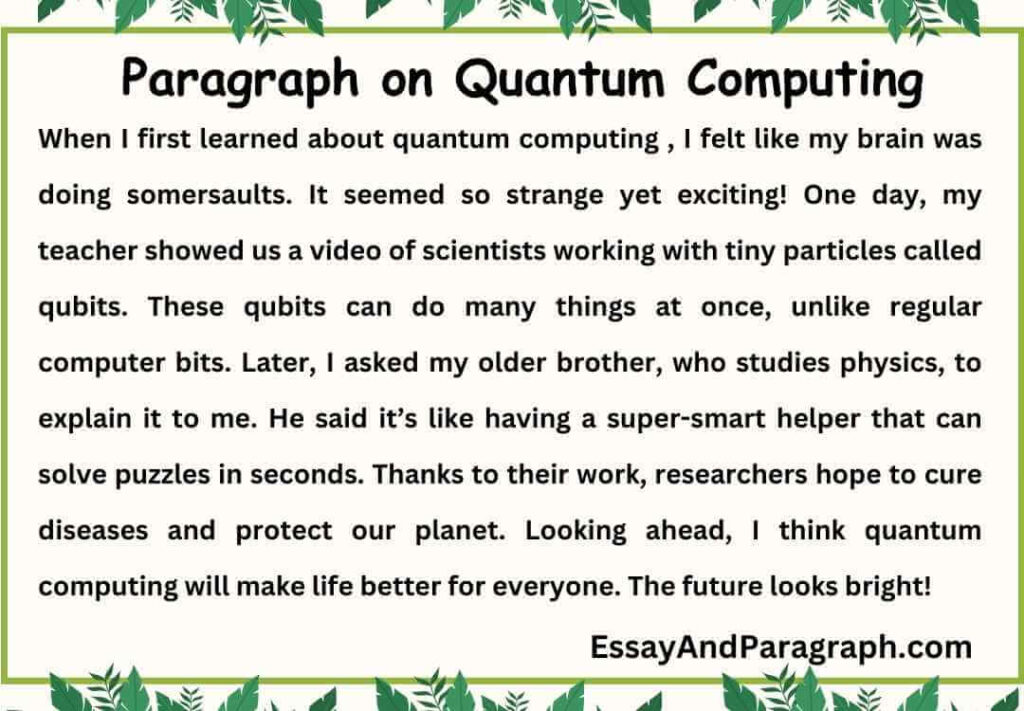Have you ever wondered how computers could solve problems faster than we ever thought possible? That’s where quantum computing comes in! When I first heard about it, I was both amazed and a little confused—it sounded like something out of a sci-fi movie. Over time, I’ve had the chance to learn more about this incredible field and meet some brilliant minds who are making it happen. In this article, we will learn how to write paragraphs on quantum computing in different lengths (100, 150, 200, 250, 300 words). By the end, you’ll see why quantum computing is such a big deal and how it might change the world. Let’s get started!
Paragraph on Quantum Computing [100 words]
When I first learned about quantum computing , I felt like my brain was doing somersaults. It seemed so strange yet exciting! One day, my teacher showed us a video of scientists working with tiny particles called qubits. These qubits can do many things at once, unlike regular computer bits. Later, I asked my older brother, who studies physics, to explain it to me. He said it’s like having a super-smart helper that can solve puzzles in seconds. Thanks to their work, researchers hope to cure diseases and protect our planet. Looking ahead, I think quantum computing will make life better for everyone. The future looks bright!

Paragraph on Quantum Computing [150 words]
The first time I saw quantum computing mentioned in a magazine, I couldn’t stop thinking about it. To understand it better, I joined a science club at school. There, we built simple models of circuits and talked about how qubits work. Our instructor, Ms. Lee, explained that qubits can exist in two states at the same time—like flipping a coin that’s both heads and tails! She also told us about Dr. John Preskill, a famous scientist who helps people learn about quantum tech. After weeks of experiments, our team created a basic simulation of a quantum algorithm. It wasn’t perfect, but it gave us a glimpse of its power. Now, I dream of what’s next: maybe solving climate change or cracking secret codes. Whatever happens, quantum computing will keep surprising us.
Paragraph on Quantum Computing [200 words]
My initial reaction to quantum computing was pure wonder. How could something so small be so powerful? To find out, I visited a university lab where researchers showed me their quantum machines. They looked like shiny chandeliers hanging inside giant fridges. A friendly scientist named Dr. Patel explained that these machines use qubits to process information much faster than normal computers. During my visit, I met other students eager to learn too. Together, we watched as they ran a program to predict weather patterns. It finished in minutes instead of hours! This kind of speed could save lives during storms. Reflecting on the trip, I realized how teamwork makes progress possible. Scientists, engineers, and even kids like me all play a role. As I look to the future, I imagine quantum computing helping doctors design personalized treatments or finding new planets in space. The possibilities feel endless!
Paragraph on Quantum Computing [250 words]
When I started exploring quantum computing , I felt a mix of excitement and curiosity. At a summer camp, we spent days learning about quantum mechanics through games and activities. One game involved pretending to be qubits, switching between “0” and “1” while solving math problems together. Our counselor, Sarah, taught us about entanglement—a spooky connection between particles that lets them share information instantly. Later, we Skyped with a real quantum physicist named Dr. Chen, who works at a tech company. He shared stories about building quantum processors and testing them on complex tasks. His passion inspired me to think bigger. For example, one project he worked on helped optimize traffic flow in cities, reducing pollution. Another discovery involved simulating molecules for drug development. These breakthroughs show just how transformative quantum computing can be. Moving forward, I expect it to revolutionize fields like medicine, energy, and artificial intelligence. Imagine computers predicting earthquakes or designing eco-friendly materials. With each step, this technology proves it’s here to stay. Who wouldn’t be excited?
Paragraph on Quantum Computing [300 words]
I still remember the moment I truly grasped the potential of quantum computing . It happened during a lecture by Dr. Michelle Simmons, a pioneer in the field. She described how quantum computers could solve problems that stump even the best supercomputers today. Her enthusiasm was contagious, and I left feeling inspired to dive deeper. Over the next few months, I attended workshops, read books, and collaborated with fellow students. Together, we explored topics like cryptography and machine learning. One standout experience was meeting a young coder named Alex, who developed a quantum app to analyze DNA sequences. His creativity reminded me that innovation has no age limit. Another highlight was touring IBM’s quantum lab, where engineers demonstrated their latest processor. Watching those qubits hum with energy gave me goosebumps. Today, quantum computing is already changing industries, from finance to healthcare. Researchers are using it to model chemical reactions, improve supply chains, and enhance cybersecurity. Yet, there’s still so much to discover. What if we could simulate entire ecosystems or unlock the secrets of the universe? Or create AI systems smarter than anything we’ve seen? The potential of quantum computing seems limitless. As new technologies emerge, ethical questions arise too. But with responsible innovation, I’m hopeful about the future. Who wouldn’t want to live in a world shaped by science and imagination?
FAQs on Quantum Computing
What is quantum computing in simple terms?
Quantum computing uses the rules of quantum mechanics to process information in ways regular computers can’t. Instead of using bits (which are either 0 or 1), it uses qubits, which can be both 0 and 1 at the same time. Think of it like flipping a coin that lands on both sides simultaneously. This allows quantum computers to solve certain problems much faster. For example, they could break codes, simulate molecules, or optimize routes for delivery trucks.
Why is quantum computing important for the future?
The future depends on quantum computing because it can solve problems too complex for today’s technology. For instance, it could help design life-saving drugs by simulating how molecules interact. It might also improve weather forecasts, reduce traffic jams, and secure online data. As our world becomes more connected, we need smarter tools to handle growing challenges. Investing in quantum tech ensures a brighter, more efficient future for everyone.
Can anyone study quantum computing?
Yes! Anyone interested in science and math can study quantum computing . Schools offer classes in physics, computer science, and coding to build a foundation. Colleges provide advanced courses for deeper learning. You don’t need fancy equipment to start—just curiosity and determination. Many experts began with simple experiments or online tutorials. If you love solving puzzles and imagining the impossible, quantum computing might be perfect for you.
How does quantum computing affect everyday life?
Though still in early stages, quantum computing promises to transform daily life. For example, it could lead to stronger encryption for online banking, faster internet searches, and better medical treatments. Farmers may use it to grow healthier crops, while engineers design safer cars. Even video games could become more realistic thanks to quantum algorithms. Though not widespread yet, its influence will grow as the tech advances.
Is quantum computing safe?
Safety is a priority in quantum computing . Researchers follow strict guidelines to ensure systems are reliable and secure. However, debates continue over potential risks, like breaking current encryption methods. Transparency and regulation will play key roles in maintaining trust. When developed responsibly, quantum tech offers immense benefits without compromising safety.
What jobs are available in quantum computing?
Careers in quantum computing span diverse fields, from engineering to software development. Popular roles include quantum researcher, data analyst, hardware engineer, and AI specialist. Creative thinkers might enjoy designing apps or writing algorithms. Others focus on teaching or policy-making. No matter your interest, there’s likely a quantum job that fits. Plus, demand keeps growing as innovations expand globally.
Topic-Related Quotes
- “The future belongs to those who believe in the beauty of their dreams.” – Eleanor Roosevelt
- “Imagination will often carry us to worlds that never were. But without it, we go nowhere.” – Carl Sagan
- “We are limited, not by our abilities, but by our vision.” – Unknown
- “Science is a way of thinking much more than it is a body of knowledge.” – Carl Sagan
- “What lies behind us and what lies before us are tiny matters compared to what lies within us.” – Ralph Waldo Emerson
- “The measure of intelligence is the ability to change.” – Albert Einstein
- “Every great advance in science has issued from a new audacity of imagination.” – John Dewey
Summary on Quantum Computing
Quantum computing is an extraordinary field that blends science and imagination to tackle challenges beyond traditional computers. From curing diseases to protecting the environment, its impact is vast and growing. Through personal experiences, I’ve witnessed how collaboration drives innovation—from classrooms to cutting-edge labs. Whether it’s simulating weather patterns or decoding DNA, each breakthrough brings us closer to solving humanity’s biggest problems. While hurdles remain, especially around cost and accessibility, the benefits far outweigh the risks. By continuing to invest in education and research, we can unlock even greater possibilities. Imagine a world where clean energy powers every home, personalized medicines heal every illness, and mysteries of the cosmos unfold before our eyes. That’s the promise of quantum computing . As we move forward, staying curious and engaged will help us shape this journey responsibly. So, whether you’re a student dreaming of becoming a scientist or simply someone fascinated by the unknown, take a moment to appreciate the wonders of quantum tech. After all, the next big idea could come from you!




